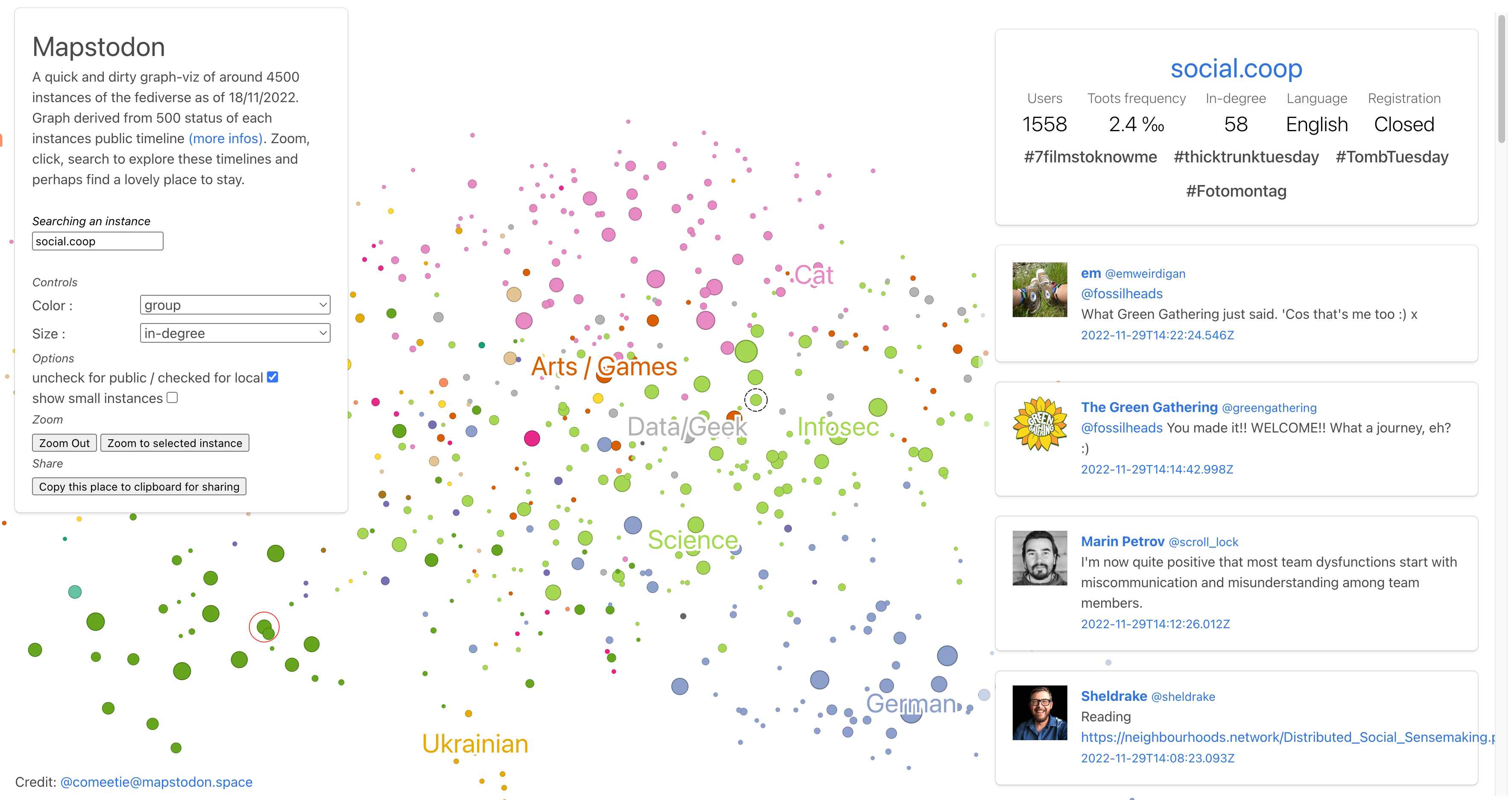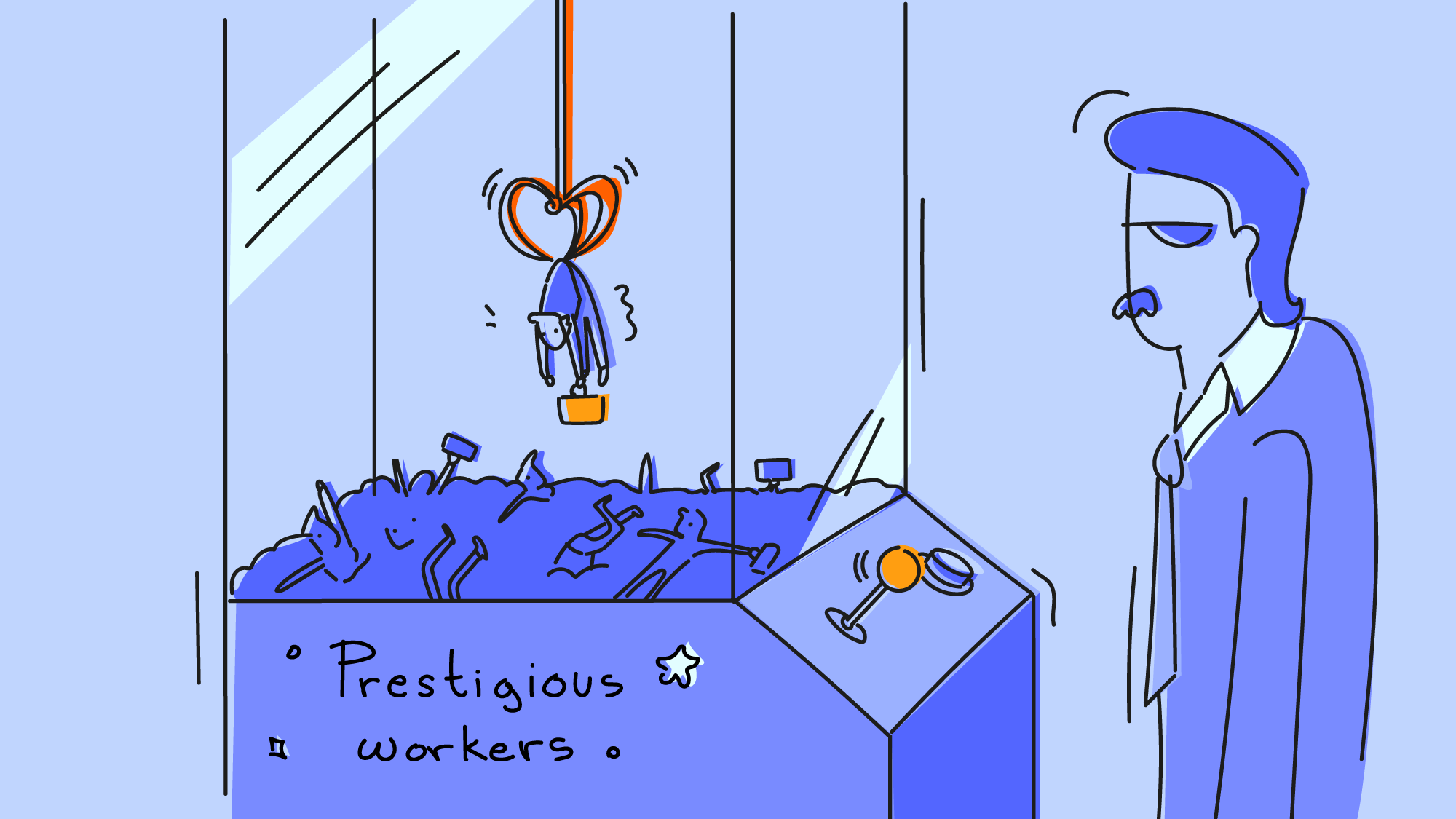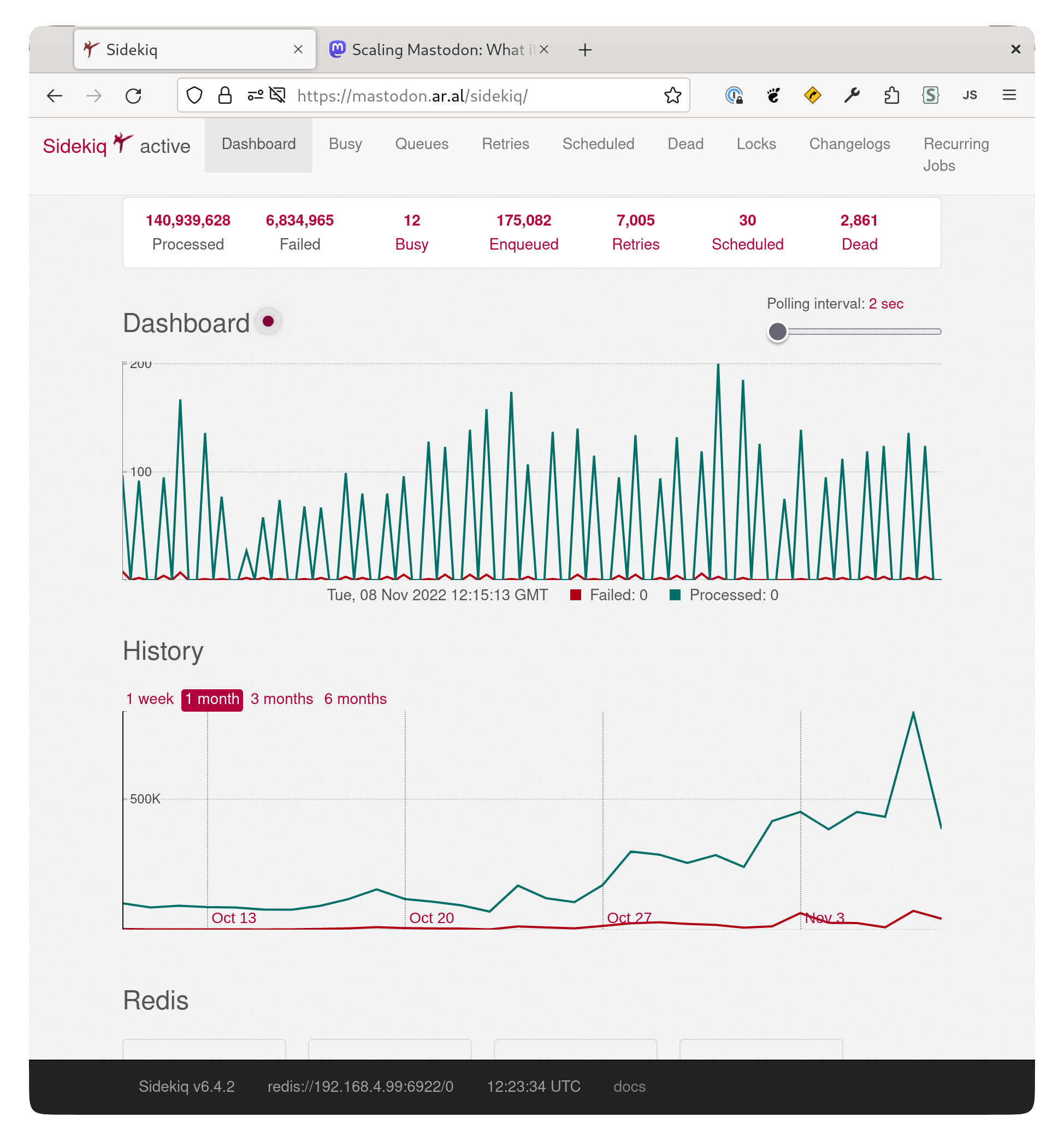2022
That was 2022

Inspired by Warren Ellis closing his LTD site until 2023, this is a notification that Thought Shrapnel is done for the year!
I may send out a 'best of the year' newsletter (sign up here!) if I don't end up in a mince pie coma, but either way thanks for your attention and appreciation. See you in January!
Image by Kelly Sikkema
'Nightfall' meteorite contains new and unusual minerals
OK, so it’s not Vibranium, but discovering potentially three new minerals in a meteorite found in Somalia is pretty exciting! I wonder what new substances we’ll find as we further explore space, and what uses we’ll discover for them?
The meteorite, the ninth largest recorded at over 2 metres wide, was unearthed in Somalia in 2020, although local camel herders say it was well known to them for generations and named Nightfall in their songs and poems.Source: Researchers discover two new minerals on meteorite grounded in Somalia | The Guardian[…]
Dr Chris Herd, a professor in the department of earth and atmospheric sciences and the curator of the collection, said that while he was classifying the rock he noticed “unusual” minerals. Herd asked Andrew Locock, the head of the university’s electron microprobe laboratory, to investigate.
[…]
Similar minerals had been synthetically created in a lab in the 1980s but never recorded as appearing in nature, Herd said, adding that these new minerals could help understand how “nature’s laboratory” works and may have as yet unknown real-world uses. A third potentially new mineral is being analysed.
No benefits to post-Brexit deregulation
Coupled with the pandemic and the energy crisis, Brexit is absolutely destroying the UK at the moment. If you haven’t watched The Brexit Effect made by the Financial Times, then you really, really should.
This article in the New Statesman argues that the deregulation touted as a huge benefit of Brexit isn’t wanted or needed by most UK businesses. It’s the red tape added by being outside the EU single market that’s the problem.
Most businesses have no interest or understanding of the government’s plans for post-Brexit deregulation. And a majority of companies could not name a single EU law that they would change or remove to become more profitable, according to findings shared exclusively with the New Statesman by the British Chambers of Commerce.Source: Exclusive: Most UK businesses see no benefit in post-Brexit deregulation | New Statesman[…]
In a new survey of 938 businesses, made up largely of SMEs (and therefore representative of the UK economy), just 14 per cent specified an EU regulation they would remove; 58 per cent of firms had no preference over the amendment or removal of any EU regulation. Half said that deregulation is either a low priority or not a priority at all.
Study shows no link between age at getting first smartphone and mental health issues
Where we live is unusual for the UK: we have first, middle, and high schools. The knock-on effect of this in the 21st century is that kids aged nine years old are walking to school and, often, taking a smartphone with them.
This study shows that the average age children were given a phone by parents was 11.6 years old, which meshes with the ‘norm’ (I would argue) in the UK of giving kids one when they go to secondary school.
What I like about these findings are that parents overall seem to do a pretty good job. It’s been a constant battle with our eldest, who is almost 16, to be honest, but I think he’s developed some useful habits around technology.
Parents fretting over when to get their children a cell phone can take heart: A rigorous new study from Stanford Medicine did not find a meaningful association between the age at which kids received their first phones and their well-being, as measured by grades, sleep habits and depression symptoms.Source: Age that kids acquire mobile phones not linked to well-being, says Stanford Medicine study | Stanford Medicine[…]
The research team followed a group of low-income Latino children in Northern California as part of a larger project aimed to prevent childhood obesity. Little prior research has focused on technology acquisition in non-white or low-income populations, the researchers said.
The average age at which children received their first phones was 11.6 years old, with phone acquisition climbing steeply between 10.7 and 12.5 years of age, a period during which half of the children acquired their first phones. According to the researchers, the results may suggest that each family timed the decision to what they thought was best for their child.
“One possible explanation for these results is that parents are doing a good job matching their decisions to give their kids phones to their child’s and family’s needs,” Robinson said. “These results should be seen as empowering parents to do what they think is right for their family.”
Four forces that constrain our actions
‘Pathetic Dot’ is not a great name for a theory, and the diagram on the Wikipedia page isn’t the best, but Christina Bowen reminded me of it during an introductory conversation yesterday.
I can’t find it again quickly, but this also reminds me of a discussion I saw about how credit scores can exert almost as much unseen social control over people in the West as very visible social control mechanisms in more authoritarian countries.
The pathetic dot theory or the New Chicago School theory was introduced by Lawrence Lessig in a 1998 article and popularized in his 1999 book, Code and Other Laws of Cyberspace. It is a socioeconomic theory of regulation. It discusses how lives of individuals (the pathetic dots in question) are regulated by four forces: the law, social norms, the market, and architecture (technical infrastructure).Source: Pathetic dot theory | WikipediaLessig identifies four forces that constrain our actions: the law, social norms, the market, and architecture. The law threatens sanction if it is not obeyed. Social norms are enforced by the community. Markets through supply and demand set a price on various items or behaviors. The final force is the (social) architecture. By that Lessig means “features of the world, whether made, or found”; noting that facts like biology, geography, technology and others constrain our actions. Together, those four forces are the totality of what constrains our action, in fashion both direct and indirect, ex post and ex ante.
[…]
The theory can be applied to many aspects of life (such as how smoking is regulated), but it has been popularized by Lessig’s subsequent usage of it in the context of the regulation of the Internet.
French views of Brexit
It’s always interesting reading articles from foreign newspapers about the state of the UK. I wish it were true that conversations about Brexit and the damage it’s done were on the table. But I just don’t see it.
Brexit is once again at the heart of the British debate. Experts and the media are openly criticizing its negative effects on the UK economy. On the BBC's flagship politics show Question Time and on the popular LBC talk radio station, the audience is increasingly critical of the UK's divorce from the European Union. According to a poll by the YouGov institute published on November 17, 56% of respondents believe that the country "was wrong to leave the EU" on December 31, 2020.Source: Amid an economic and social crisis, anti-Brexit sentiment is growing in the UK[…]
The presentation of an austerity budget by new Prime Minister Rishi Sunak's government on November 17 in an attempt to restore the country's financial credibility (after the disastrous episode of the Liz Truss "mini-budget") has loosened tongues. On this occasion, the Office for Budget Responsibility estimated that British living standards would plummet by 7% over the next two years. This independent government body said that Brexit "has had a significant negative impact" on British foreign trade, with the decline amounting to 15% over the long term.
Who wants to live forever?
I definitely feel the middle-aged white guy urge to focus on health, nutrition, etc. But I just felt really sorry when I watched the start of a video where Bryan Johnson, who sold his company to PayPal, goes through his routine. He just looks… lonely?
Photo below is of Jack Dorsey, former Twitter CEO, who also follows an ascetic lifestyle.
Who wants to live for ever? Not me, with all due respect to Freddie Mercury for asking, and possibly not you either. Only a third of Britons even want to make it to 100, according to a recent Ipsos poll carried out for the British not-for-profit initiative the Longevity Forum. This suggests less a death wish than a fear of what growing old may actually involve. Tellingly, the older the respondent already was, the less enthusiastic they were about getting very much older. Extreme age can look brutal, up close.Source: Who wants to live to 100 on a diet of lentil and broccoli slurry? Mostly rich men | The GuardianPersonally, I want very much to live until my child no longer needs me, whenever that may be, and to enjoy some kind of retirement. But beyond that, I just want to live until it feels like enough, and then ideally to have some control over the end. I’d rather have a busy, happy, meaningful life and drop dead at 75 than make it to 150 and run out of ways to fill the endless days.
Japanese miniature dioramas
I love these so much.
Miniature Calendar is an incredible ongoing project by Japanese artist Tatsuya Tanaka, that features beautiful miniature dioramas of everyday life using common household objects such as food, cloth, stationery, electronic devices, and even masks.Source: Japanese Artist Creates Amazing Miniature Dioramas Every Day For 10 Years | Digital Synopsis
(Partially) visualising the Fediverse
About a decade ago, it was possible to visualise your LinkedIn network. I really liked it, especially as I had three distinct groups of connections (EdTech, schools, and Higher Ed).
This website allows you to visualise around 4.5k Fediverse instances, as of last week. You can change the colour and size of the dots depending on number of users, posts, theme, etc.
Exercise.cafe isn’t on there, nor is wao.wtf. But it’s still a useful tool.
Source: Mapstodon
Collectively-owned Fediverse instances
I’m essentially bookmarking this publicly as it’s a useful reference for Fediverse instances (all currently running Mastodon!) which are collectively owned.
What I’m interested in is diversifying and going beyond this very useful list. First, I’d love examples to be added which are running other Fediverse software than Mastodon. For example, I’ve got a test instance of Misskey running at wao.wtf.
Second, I’m interested in the governance of these instances. If you’re not involved with co-operatives or other organisations that are democratically operated, it can seem like a bit of a black box. So I think we need a collaboratively-created guide to collective decision-making processes when it comes to Fediverse instances.
Fediverse instances with an explicit system of shared governance, usually made legally binding through an incorporated association or cooperative.Source: Collectively owned instances - fediparty | Codeberg.orgThis page will list also instances which are closed for registrations and dead instances, so that we can collectively learn from their experience.
Originally created by @nemobis@mamot.fr inspired by a @Matt_Noyes@social.coop thread.
Prestige and associational value
This is 100% true and one of the reasons that I think that Open Badges and Verifiable Credentials are so awesome. Associational value is built-in for human beings, as we’re social creatures who set store by what other people value.
For example, I’m Dr. Belshaw which has a certain cachet and status in some circles. But people are usually much more interested/impressed by the fact that I worked for Mozilla and that one of our co-op’s clients is Greenpeace.
Them’s the breaks. And I feel like passing on this kind of wisdom to the younger generations is really important, to be honest, as a way that the world actually works.
A lot of people suspect that having-been part of a prestigious organisation (such a a famous university or an "elite" org in your field) gets you an unfair advantage when applying for future jobs.Source: Associational Value | Atoms vs BitsThere are two main avenues you could imagine for this advantage. One is basically nepotism: through the organisation you meet lots of other people who will later give you preferential access to jobs.
A second avenue is throughthe associtional value of the institution: that people with no specific connection to you or that organisation will see the name of Prestigious Institution on your resume and hire you because, well, you were at Prestigious Institution.
[…]
I think associational value often comes out of single-sentence descriptions of what somebody has done, and that therefore there are often relatively-easy ways to get 99% of the associational benefits of a prestigious institution at a much lower cost.
For example, in the magazine-writing world, people are often (approximately) defined by 1-3 of the most famous publications they’ve ever written for: “X’s work has appeared in TK, TK and TK,” or “this is my friend Y, she writes for [famous media brand].”
[…]
I’m not entirely sure how to work around this one, beyond the “try to get a mild affiliation with a prestigious institution, even if it’s an incredibly silly one” hack.
Richard Hammond's near-death experience
Richard Hammond, co-presenter of the original Top Gear and The Grand Tour reflects on his near-death experience. Worth a watch.
[embed]www.youtube.com/watch
Source: Richard Hammond explains what he experienced during his coma | 310mph Crash | YouTube
Some tips for adding winter cheer
There are some excellent suggestions in this list of 53 things that can give you a lift over the winter months. I’ve highlighted three of my favourites below!
7. Walk with an audio book On a crisp winter’s day, there is no finer companion than 82-year-old actor Seán Barrett. His sublime narration of Mick Herron’s Slough House series, about a bunch of MI5 outcasts, will bring cheer to the gloomiest days.Source: Need a lift? Here’s 53 easy ways to add cheer to your life as winter looms | The Guardian[…]
18. Buy foods you can’t identify Purchase food in shops where the majority of products have no English on the packaging, so eating what you buy is an adventure. It might be black limes, a box of tamarinds or a rosewater drink with vermicelli pieces. It’s like travelling without travelling.
[…]
50. Sweat in a sauna We’ve all been told about the wellbeing boost of plunging into cold water, wild swimming and turning your shower down to freezing. But who wants to be cold? Book yourself into a sauna. Let the heat and steam soak deep into your bones and sweat out all your worries.
Convivial social networking
Adam Greenfield composed a thread this morning on Mastodon in which he referenced Ivan Illich’s call for conviviality. This was also referenced in a post by Audrey Watters which was shared a few minutes later in my timeline by Aaron Davis.
Such synchronicity is, of course, entirely random but meshed well with my state of mind this morning. I find it interesting that Audrey thinks it’s ridiculous to think that Mastodon is “what’s next” and instead looks to email. For what it’s worth, I see the Fediverse as being a lot like email, actually.
Given that she’s got a brain and experience several times the size of mine, I’d love it if she wrote more about this…
It's easy to look at the world right now and focus on the shit... The Republican takeover of the House. The economy. The way my body feels after running 6.85 miles on Sunday morning and then sitting in the car for 2+ hours on the drive home. The implosion of Twitter. The ridiculousness of suggesting Mastodon is "what's next." And so on. I mean, I have lots of thoughts on all of these, particularly the Twitter and Mastodon brouhaha. I read an email newsletter that referenced a Twitter thread in which Alexis Madrigal argued that Twitter, at least in its original manifestation, was for "word people." I quite like that framework, and it's helpful in showcasing how Facebook and now TikTok really would rather the ascendant influencers be picture people. TV people, even. It's time to pull out 'Tools for Conviviality', perhaps, for a re-read, because I'm loathe to make the argument that email is, in fact, where we find technological conviviality these days. But that's the direction I'm considering taking the argument. If I were to write about it and think about it more, that is.Source: The Week in Review: What's Good | Audrey Watters
Mourning what we've lost
I found this an eloquent explanation of emotions and feelings I've experienced over the last couple of weeks as the Fediverse has been 'invaded' by people considering themselves 'refugees' from Twitter.
As Hugh Rundle points out in this post, some of us have already mourned what we'd lost with Twitter and had made our home in a comfy, homely new place. There were rules, both implicit and explicit, about how to behave, but now...

For those of us who have been using Mastodon for a while (I started my own Mastodon server 4 years ago), this week has been overwhelming. I've been thinking of metaphors to try to understand why I've found it so upsetting. This is supposed to be what we wanted, right? Yet it feels like something else. Like when you're sitting in a quiet carriage softly chatting with a couple of friends and then an entire platform of football fans get on at Jolimont Station after their team lost. They don't usually catch trains and don't know the protocol. They assume everyone on the train was at the game or at least follows football. They crowd the doors and complain about the seat configuration.
It's not entirely the Twitter people's fault. They've been taught to behave in certain ways. To chase likes and retweets/boosts. To promote themselves. To perform. All of that sort of thing is anathema to most of the people who were on Mastodon a week ago. It was part of the reason many moved to Mastodon in the first place. This means there's been a jarring culture clash all week as a huge murmuration of tweeters descended onto Mastodon in ever increasing waves each day. To the Twitter people it feels like a confusing new world, whilst they mourn their old life on Twitter. They call themselves "refugees", but to the Mastodon locals it feels like a busload of Kontiki tourists just arrived, blundering around yelling at each other and complaining that they don't know how to order room service. We also mourn the world we're losing.
[...]
I was a reasonably early user of Twitter, just as I was a reasonably early user of Mastodon. I've met some of my firmest friends through Twitter, and it helped to shape my career opportunities. So I understand and empathise with those who have been mourning the experience they've had on Twitter — a life they know is now over. But Twitter has slowly been rotting for years — I went through that grieving process myself a couple of years ago and frankly don't really understand what's so different now compared to two weeks ago.
There's another, smaller group of people mourning a social media experience that was destroyed this week — the people who were active on Mastodon and the broader fediverse prior to November 2022. The nightclub has a new brash owner, and the dancefloor has emptied. People are pouring in to the quiet houseparty around the corner, cocktails still in hand, demanding that the music be turned up, walking mud into the carpet, and yelling over the top of the quiet conversation.
All of us lost something this week. It's ok to mourn it.
Source: Home invasion | Hugh Rundle
Image: Joshua Sukoff
Second-order effects of widespread AI
Sometimes ‘Ask HN’ threads on Hacker News are inane or full of people just wanting to show off their technical knowledge. Occasionally, though, there’s a thread that’s just fascinating, such as this one about what might happen once artificial intelligence is widespread.
Other than the usual ones about deepfakes, porn, and advertising (all which should concern us) I thought this comment by user ‘htlion’ was insightful:
AI will become the first publisher of contents on any platform that exists. Will it be texts, images, videos or any other interactions. No banning mechanisms will really help because any user will be able to copy-paste generated content. On top of that, the content will be generated specifically for you based on "what you like". I expect a backlash effect where people will feel like becoming cattle which is fed AI-generated content to which you can't relate. It will be even worse in the professional life where any admin related interaction will be handled by an AI, unless you are a VIP member for this particular situation. This will strengthen the split between non-VIP and VIP customers. As a consequence, I expect people to come back to localilty, be it associations, sports clubs or neighborhood related, because that will be the only place where they will be able to experience humanity.Source: What will be the second order effects widespread AI? | Hacker News
Hyperbolic discounting applied to habit-formation
We live near the middle of town, a five minute walk to the leisure centre — and less than that to get to the shops. As a result, we don’t use our cars at all for three days of the week, and I go to the gym at the leisure centre every day.
My grandmother, who wasn’t well-off and who rented all her life, used to ensure that she lived right next to a bus stop. Although she wouldn’t have used the phrase from this article, she knew that she was more likely to travel and get places that way!
You may have heard of hyperbolic discounting from behavioral economics: people will generally disproportionally, i.e. hyperbolically, discount the value of something the farther off it is. The average person judges $15 now as equivalent to $30 in 3-months (an annual rate of return of 277%!).Source: Hyperbolic Distance Discounting | Atoms vs Bits[…]
But what about when something is farther off in space rather than time?
Say a 1-hour activity is 10 minutes away, compared to 5 minutes away. The total time usage would be 80 vs 70 minutes, about 15% longer. A linear model would predict that it would feel 15% more costly, and then proportionally affect your likelihood of going. In practice though, an extra 10 or 20 minutes of travel time will somehow frequently nudge you into non-participation.
The (surprising) oldest full sentence in the Canaanite language in Israel
Apparently this comb has an inscription on it which reads “May this tusk root out the lice of the hair and the beard.” It was made from an imported elephant tusk!
The comb measures just 3.5 by 2.5 centimeters (roughly 1.38 by 1 inches), with teeth on both sides, although only the bases remain; the rest of the teeth were likely broken long ago. One side had thicker teeth, the better to untangle knots, while the other had 14 finer teeth, likely used to remove lice and their eggs from beards and hair. Further analysis showed noticeable erosion at the comb's center, which the authors believe was likely due to someone's fingers holding it there during use.Source: Ancient wisdom: Oldest full sentence in first alphabet is about head lice | Ars TechnicaThe authors also used X-ray fluorescence spectroscopy, Fourier-transform infrared spectroscopy, and digital microscopy to confirm that the comb is made of ivory from an elephant tusk, suggesting it was imported. The team sent a sample from the comb to the University of Oxford’s radiometric laboratory, but the carbon was too poorly preserved to accurately date the sample.
The inscription consists of 17 letters (two damaged) that together form a complete seven-word sentence. The letters aren’t well-aligned, per the authors, nor are they uniform in size; the letters become progressively smaller and lower in the first row, with letters running from right to left. When whoever engraved the comb reached the edge, they turned it 180 degrees and engraved the second row from left to right. The engraver actually ran out of room on the second row, so the final letter is engraved just below the last letter in that row. Still, said engraver had to be fairly skilled, given the small size of the lettering.
Rituals for moving jobs when working from home
Terence Eden reflects on changing jobs when working from home and how… weird it can be. While I’ve been based from two different converted garages during the past decade, I’ve travelled a lot so it has felt different.
I can imagine, though, if that’s not the case, it can all feel a little bit discombobulating!
One Friday last year, I posted some farewell messages in Slack. Removed myself from a bunch of Trello cards. Had a quick video call with the team. And then logged out of my laptop. I walked out of my home office and sat in my garden with a beer.Source: Job leaving rituals in the WFH era | Terence Eden’s BlogThe following Monday I opened the door to the same office. I logged in to the same laptop. I logged into a new Slack - which wasn’t remarkably different from the old one. Signed in to a new Trello workspace - ditto. And started a video call with my new team.
I’ll admit, It didn’t feel like a new job!
There was no confusing commute to a new office. No having to work out where the toilets and fire exits were. No “here’s your desk - it’s where John used to sit, so people might call you John for a bit”. I didn’t even have to remember people’s names because Zoom showed all my colleagues' names & job titles.
There was no waiting in a liminal space while receptionists worked out how to let me in the building.
In short, there was no meaningful transition for me.
Decentralisation begins at decentring yourself
Aral Balkan, who has 22,000 followers on the Fediverse and who recently had a birthday, has written about the influx of people from Twitter. As I’ve found, especially on my personal blog, you can essentially run a Distributed Denial of Service (DDoS) attack on yourself by posting a link to your blog to the Fediverse. As each server pings it, the server can eventually buckle under the weight.
What follows is a really useful post in terms of Aral’s journey towards what he calls the ‘Small Web’. While I don’t necessarily agree that we should all have our own instances, I do think it’s useful for organisations of every size to run them.
If Elon Musk wanted to destroy mastodon.social, the flagship Mastodon instance, all he’d have to do is join it.Thank goodness Elon isn’t that smart.
I jest, of course… Eugen would likely ban his account the moment he saw it. But it does illustrate a problem: Elon’s easy to ban. Stephen, not so much. He’s a national treasure for goodness’ sake. One does not simply ban Stephen Fry.
And yet Stephen can similarly (yet unwittingly) cause untold expense to the folks running Mastodon instances just by joining one.
The solution, for Stephen at least, is simple: he should run his own personal instance.
(Or get someone else to run it for him, like I do.)
Running his own instance would also give Stephen one additional benefit: he’d automatically get verified.
After all, if you’re talking to, say, @stephen@social.stephenfry.com, you can be sure it’s really him because you know he owns the domain.















